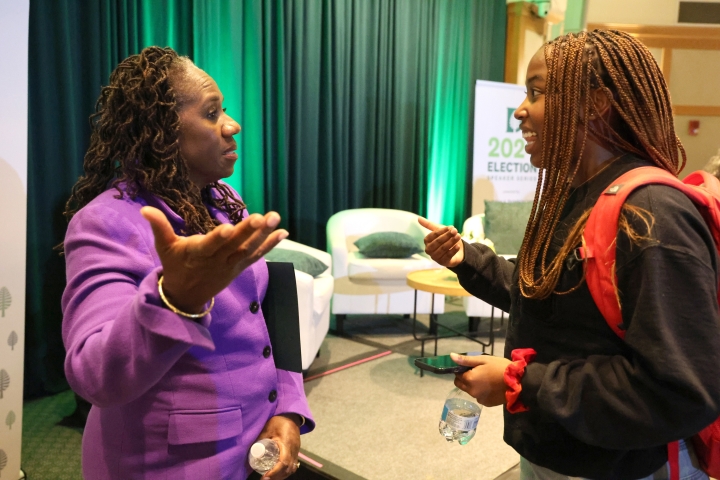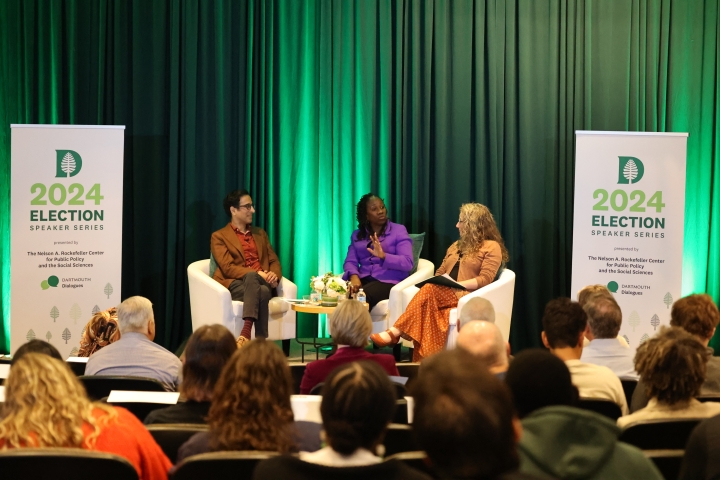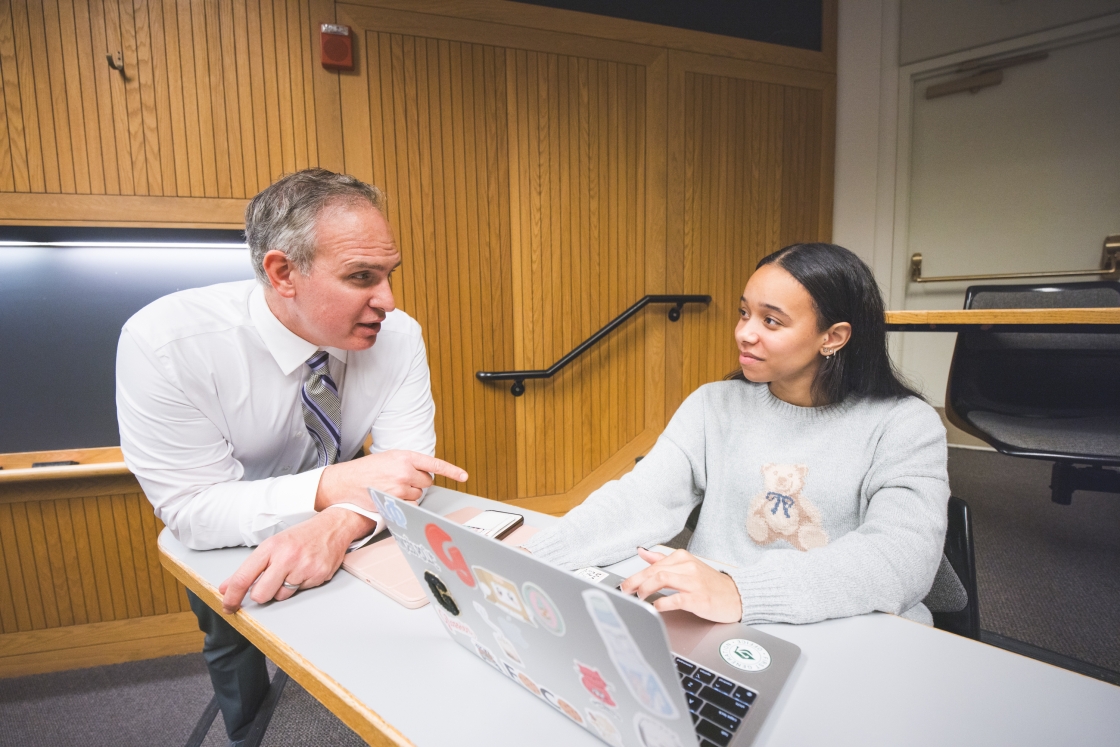With Election Day six weeks away, Dartmouth kicked off its 2024 Election Speaker Series Tuesday evening with civil rights lawyer and scholar Sherrilyn Ifill, who discussed ways the Supreme Court wields power to build or weaken the foundations of democracy.
Ifill served as president and director-counsel of the NAACP Legal Defense Fund from 2013 to 2022 and now holds the inaugural Vernon E. Jordan Jr., Esq. Endowed Chair in Civil Rights at Howard University School of Law.
The first guest in the 10-part series co-sponsored by the Nelson A. Rockefeller Center for Public Policy and Dartmouth Dialogues, Ifill spoke to 140 attendees in Filene Auditorium and another 40 via livestream, responding to questions from Sonu Bedi, the Joel Parker 1811 Professor in Law and Political Science and director of the Dartmouth Ethics Institute, and Rockefeller Center Lecturer Julie Kalish ’91.
Bedi began by asking Ifill about her forthcoming book, Is this America? The title echoes a question famed civil rights activist Fannie Lou Hamer posed to the Democratic Party’s credentials committee as she fiercely defended the right of the Mississippi Freedom Democratic Party, which she founded, to be seated at the 1964 political convention.
“ ‘Is this America?’ ” Ifill said Hamer asked, “ ‘where we have to take our phone off the hook because we’re threatened at night? Is this America? Just because we want to be free, we are subject to beatings. And if this is America, then I question America.’ ”
In much of the conversation, Ifill questioned recent Supreme Court decisions relating to racial justice.
“Voting rights is a perfect example,” she said, noting that, since 1965, “every time the Voting Rights Act has been enacted or ratified, it has been by a bipartisan Congress and signed by a Republican president, including in 2006.”
She questioned a decision in 2013 when the Supreme Court struck down a key portion of the law and Chief Justice John Roberts said that racism was not the kind of problem that it had been.
“Since voting carries such powerful weight, one of my criticisms of the current Supreme Court majority is the failure of this court to think about the consequences of its decisions,” Ifill said.
Yet despite being “deeply concerned” about what she described as troubling inconsistencies in recent Supreme Court rulings, a lack of transparency about so-called “shadow” deliberations, and a refusal to establish a code of ethics, Ifill concluded the evening with a message of hope and a call to action.
“When we see that our country is broken in places, it creates an opportunity to make it better,” she said.
Ifill also implored her audience to prepare themselves fully to vote, and not just for top-of-the-ticket candidates.
“When I’m doing poll watching in Alabama on Election Day and something is wrong at the polls, the person I have to call is the probate judge, because that’s the person in Alabama who’s in charge of administering the elections,” she said. “Do you vote in probate judge elections?”
By not fully researching and choosing from a full slate of contenders, “we leave power on the table, and then when other people pick it up, we’re mad about it,” Ifill said.

Her warning resonated with the student who introduced her. Ajayda Griffith ’27, from Elmont, N.Y., secretary of the NAACP at Dartmouth, plans to do plenty of civic homework before Election Day. With a double major in English and sociology and a minor in public policy, she also aims to follow Ifill’s example.
“She’s definitely a role model for me,” Griffith said after the event. “She’s doing everything I hope to do in the future. The NAACP is a historical powerhouse for civil rights and civil justice, but it’s not just about activism; there’s a legal part of all that. I want to go to law school and advocate for people who look like me or come from communities like my own.”
The Election Speaker Series grew from a government and public policy course, The 2024 Election, taught by Russell Muirhead, the Robert Clements Professor of Democracy and Politics; Herschel Nachlis, associate director and senior policy fellow at the Rockefeller Center; and William Wohlforth, the Daniel Webster Professor of Government. Before taking the stage, Ifill spoke to the class about the 14th Amendment, which was ratified after the Civil War and guaranteed equal protection under the law for all citizens, including formerly enslaved Americans.
“The 14th amendment is all about rebirth,” she said. “It is the reset of our country. It is our second Constitution.”
Between now and next February, the Election Speaker Series will bring to campus policy leaders, public officials, and analysts from across the political spectrum. The roster includes, among other luminaries, U.S. Sen. John Fetterman, D-Pa.; Vice President Mike Pence; Harry Enten ’11, senior political data reporter at CNN; and attorney, author, and educator Anita Hill.
The next speaker will be Bill Kristol, a founder of The Weekly Standard and a former aide in the administrations of presidents Ronald Reagan and George H. W. Bush. Kristol will speak on Thursday, Sept. 26, on the future of conservatism, at 5 p.m. in Filene Auditorium.
The series is open to the public. Tickets are free with registration. For some events, all seats have been reserved, but there is a waitlist and online viewing is available.


